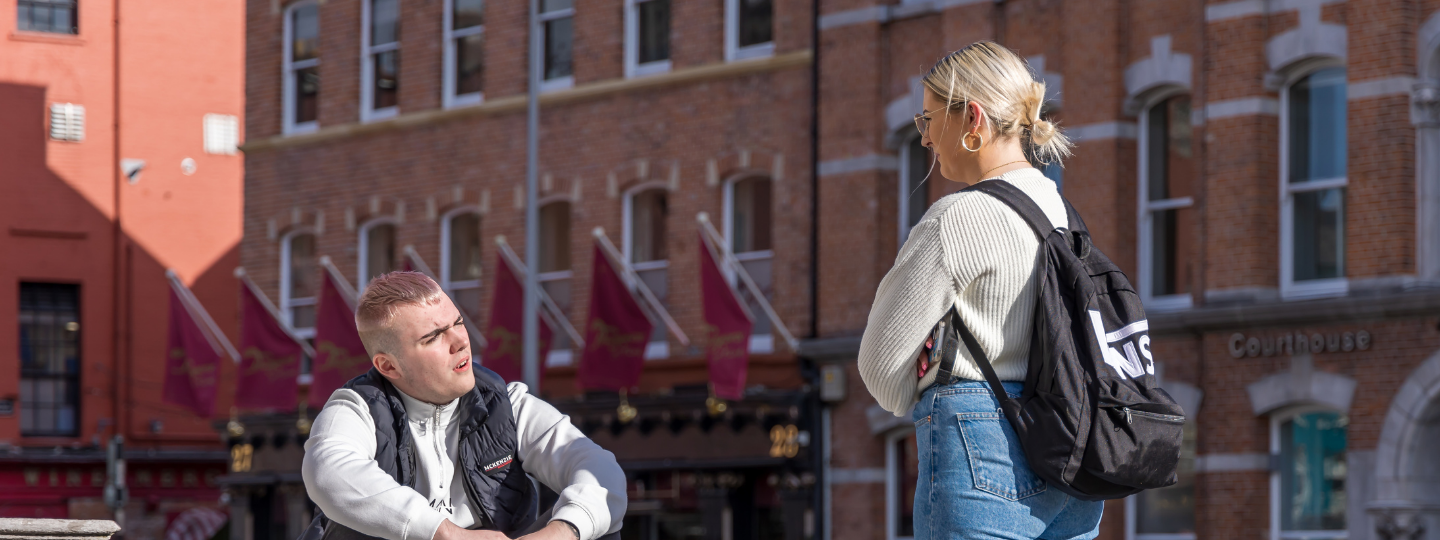Mental health is something we all have. It’s an essential part of all of us which includes our thoughts and feelings, how we are getting on with other people and how we are managing day-to-day life.
Category: Information and resources
Emma’s story
When I was in Junior Cert, I felt a bit stressed, but so did everyone else. It wasn’t too bad, but I was looking forward to doing transition year for a bit of a break.
When I started in TY, things began to go downhill. My best friend had gone straight into fifth year and started hanging around with a new group. We weren’t spending as much time with each other and I didn’t feel like going out as much. You’re supposed to really enjoy TY, but I found it hard to get motivated.
It felt like there was no point in going in to school most days. I started having arguments with my mum about homework and getting up in the morning. Everything just felt boring and pointless.
It all came to a head when we were at my Nan’s 80th birthday. All my family were there and usually I’d really enjoy family parties, but I just didn’t feel like I wanted to be there. My aunt came up to me and started asking about school. You can tell when someone is just asking to be polite, but she was genuinely interested.
Watch: Concerned about being left behind
When a group of friends head off in different directions after finishing school, it is easy to feel concerned about being left behind.
Jigsaw volunteers Sam, Nicola and Rachel, with Youth and Community worker Sinead, talk about how they feel about leaving their school friends as they head off on new adventures.
Watch: Worried about making friends
After not clicking with people in first year, Jess, Jigsaw Volunteer talks to Conor, Jigsaw Clinician about heading back to college and being worried about making friends all over again.
Conor explains that when we have had bad experiences with friendships, picking ourselves back up it can be challenging. We might be feeling rejected, or a bit hopeless about meeting new people.
Watch: How to start a conversation
Eimear, Jigsaw volunteer, asks for advice about how to start a conversation in a new situation, for example when starting a new course.
Jigsaw works with many young people who go to a class, society meetings or football training and still feel lonely. This is because they find it really hard to talk to someone. So they’re going, but not connecting. That can be really hard and there’s not a simple fix.
When we’ve gone through difficult experiences like being bullied, or have had negative relationships, we can start to believe unhelpful things. We can start to believe “no one would want to speak to me” or “I’m not good enough for people to talk to”.
Ask Jigsaw: Obsessed with calorie counting
Hey, not sure if this is relevant so please feel free to ignore if there are better questions.
How do you know when you’re ‘bad enough’? I know that everyone says no problem is too small, but I can’t help but feel that if I seek help somewhere that I’d be taking the spot away from someone else who is more in need.
Over the past year, I’ve gotten super obsessed with counting my calories; restricting and then ‘binging’ (not really large amounts of food, just more than I think I should be eating) as a result, occasionally using other methods like appetite suppressants and laxatives to compensate. However, I don’t think that it’s serious as I’m not under weight or over weight yet, so I don’t think I have an eating disorder?
Not sure what I should do, I’d really appreciate an insight, as the new year is making me feel like there’s more I should be doing to be skinnier etc.
Thank you so much x
-Sershxo
Hi Sershxo,
Many people who have come to Jigsaw have worried that their problem isn’t ‘bad enough’ or that others need or deserve the support more. It is very difficult to compare problems, as there are usually so many different factors at play, including the issue or issues, the coping resources someone has, what is going on around them etc. Rather than thinking about other people who may access a service, it is more helpful to think about your own needs.
Read Your Mind project
We all learn about ourselves and how to get through life in different ways.
Talking to a family member, a friend or a health professional can help. Sometimes it can also be useful to find out for ourselves by reading a book.
Watch: Where does stress come from?
In this video, Alice, a Jigsaw volunteer, asks Sinéad, a Jigsaw clinician what causes stress and what you can do about managing it.
Watch: How can I support a friend who is stressed?
Alice, Jigsaw Youth Advisory Panel member and Sinead, Jigsaw Clinician talk about the effects of stress and how to support a friend who is stressed.
Ending a relationship
Breaking up with someone is never easy. Making a decision to move on is sad even if it’s something you both want.
If one of you wants to break up and the other doesn’t, it gets even more complicated.
However, if your relationship is abusive, emotionally or physically, you should end it. No matter how much you care about each other, ending an abusive relationship is always the right thing to do.
It doesn’t matter how long it lasted, or how serious the relationship was. It’s about what it meant to you. How you felt about that person and how the relationship actually ended will all impact how you react to it.
There is no right or wrong way to feel. Every relationship is different. Acknowledge and allow yourself to feel whatever is going on for you.




